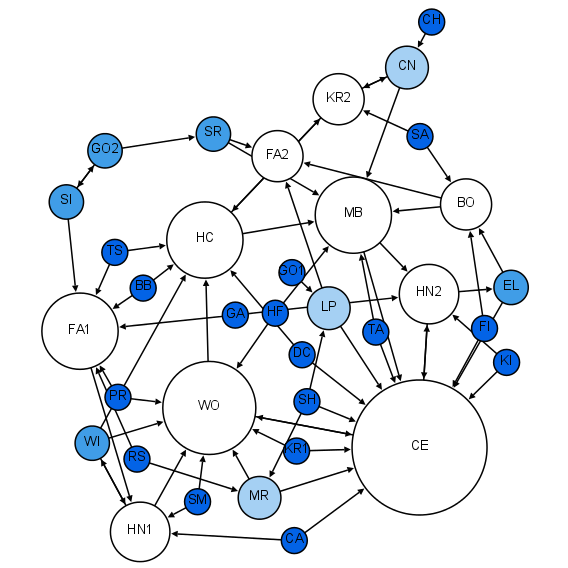|
Complex Adaptive System
A complex adaptive system (CAS) is a system that is ''complex'' in that it is a dynamic network of interactions, but the behavior of the ensemble may not be predictable according to the behavior of the components. It is '' adaptive'' in that the individual and collective behavior mutate and self-organize corresponding to the change-initiating micro-event or collection of events. It is a "complex macroscopic collection" of relatively "similar and partially connected micro-structures" formed in order to adapt to the changing environment and increase their survivability as a macro-structure. The Complex Adaptive Systems approach builds on replicator dynamics. The study of complex adaptive systems, a subset of nonlinear dynamical systems, is an interdisciplinary matter that attempts to blend insights from the natural and social sciences to develop system-level models and insights that allow for heterogeneous agents, phase transition, and emergent behavior. Overview The term ... [...More Info...] [...Related Items...] OR: [Wikipedia] [Google] [Baidu] |
Systems Theory
Systems theory is the Transdisciplinarity, transdisciplinary study of systems, i.e. cohesive groups of interrelated, interdependent components that can be natural or artificial. Every system has causal boundaries, is influenced by its context, defined by its structure, function and role, and expressed through its relations with other systems. A system is "more than the sum of its parts" when it expresses synergy or emergent behavior. Changing one component of a system may affect other components or the whole system. It may be possible to predict these changes in patterns of behavior. For systems that learn and adapt, the growth and the degree of adaptation depend upon how well the system is engaged with its environment and other contexts influencing its organization. Some systems support other systems, maintaining the other system to prevent failure. The goals of systems theory are to model a system's dynamics, Theory of constraints, constraints, conditions, and relations; and to ... [...More Info...] [...Related Items...] OR: [Wikipedia] [Google] [Baidu] |
Social Insect
Eusociality (Ancient Greek, Greek 'good' and social) is the highest level of organization of sociality. It is defined by the following characteristics: cooperative Offspring, brood care (including care of offspring from other individuals), overlapping generations within a colony of adults, and a division of labor into reproductive and non-reproductive groups. The division of labor creates specialized behavioral groups within an animal society, sometimes called castes. Eusociality is distinguished from all other social systems because individuals of at least one caste usually lose the ability to perform behaviors characteristic of individuals in another caste. Eusocial colonies can be viewed as superorganisms. Eusociality has evolved among the insects, crustaceans, trematoda and mammals. It is most widespread in the Hymenoptera (ants, bees, and wasps) and in Isoptera (termites). A colony has caste differences: queens and reproductive Male, males take the roles of the sole reprod ... [...More Info...] [...Related Items...] OR: [Wikipedia] [Google] [Baidu] |
Walter F
Walter may refer to: People and fictional characters * Walter (name), including a list of people and fictional and mythical characters with the given name or surname * Little Walter, American blues harmonica player Marion Walter Jacobs (1930–1968) * Gunther (wrestler), Austrian professional wrestler and trainer Walter Hahn (born 1987), who previously wrestled as "Walter" * Walter, standard author abbreviation for Thomas Walter (botanist) ( – 1789) * "Agent Walter", an early codename of Josip Broz Tito * Walter, pseudonym of the anonymous writer of '' My Secret Life'' * Walter Plinge, British theatre pseudonym used when the original actor's name is unknown or not wished to be included * John Walter (businessman), Canadian business entrepreneur Companies * American Chocolate, later called Walter, an American automobile manufactured from 1902 to 1906 * Walter Energy, a metallurgical coal producer for the global steel industry * Walter Aircraft Engines, Czech manufacturer of a ... [...More Info...] [...Related Items...] OR: [Wikipedia] [Google] [Baidu] |
Human–computer Interaction
Human–computer interaction (HCI) is the process through which people operate and engage with computer systems. Research in HCI covers the design and the use of computer technology, which focuses on the interfaces between people (users) and computers. HCI researchers observe the ways humans interact with computers and design technologies that allow humans to interact with computers in novel ways. These include visual, auditory, and tactile (haptic) feedback systems, which serve as channels for interaction in both traditional interfaces and mobile computing contexts. A device that allows interaction between human being and a computer is known as a "human–computer interface". As a field of research, human–computer interaction is situated at the intersection of computer science, behavioral sciences, design, media studies, and several other fields of study. The term was popularized by Stuart K. Card, Allen Newell, and Thomas P. Moran in their 1983 book, ''The Psychology of Hum ... [...More Info...] [...Related Items...] OR: [Wikipedia] [Google] [Baidu] |
Cyberspace
Cyberspace is an interconnected digital environment. It is a type of virtual world popularized with the rise of the Internet. The term entered popular culture from science fiction and the arts but is now used by technology strategists, security professionals, governments, military and industry leaders and entrepreneurs to describe the domain of the global technology environment, commonly defined as standing for the global network of interdependent information technology infrastructures, telecommunications networks and computer processing systems. Others consider cyberspace to be just a notional environment in which communication over computer networks occurs. The word became popular in the 1990s when the use of the Internet, networking, and digital communication were all growing dramatically; the term ''cyberspace'' was able to represent the many new ideas and phenomena that were emerging. As a social experience, individuals can interact, exchange ideas, share information, provi ... [...More Info...] [...Related Items...] OR: [Wikipedia] [Google] [Baidu] |
Internet
The Internet (or internet) is the Global network, global system of interconnected computer networks that uses the Internet protocol suite (TCP/IP) to communicate between networks and devices. It is a internetworking, network of networks that consists of Private network, private, public, academic, business, and government networks of local to global scope, linked by a broad array of electronic, Wireless network, wireless, and optical networking technologies. The Internet carries a vast range of information resources and services, such as the interlinked hypertext documents and Web application, applications of the World Wide Web (WWW), email, electronic mail, internet telephony, streaming media and file sharing. The origins of the Internet date back to research that enabled the time-sharing of computer resources, the development of packet switching in the 1960s and the design of computer networks for data communication. The set of rules (communication protocols) to enable i ... [...More Info...] [...Related Items...] OR: [Wikipedia] [Google] [Baidu] |
Terrorist Network Analysis
Network science is an academic field which studies complex networks such as telecommunication networks, computer networks, biological networks, cognitive and semantic networks, and social networks, considering distinct elements or actors represented by ''nodes'' (or ''vertices'') and the connections between the elements or actors as ''links'' (or ''edges''). The field draws on theories and methods including graph theory from mathematics, statistical mechanics from physics, data mining and information visualization from computer science, inferential modeling from statistics, and social structure from sociology. The United States National Research Council defines network science as "the study of network representations of physical, biological, and social phenomena leading to predictive models of these phenomena." Background and history The study of networks has emerged in diverse disciplines as a means of analyzing complex relational data. The earliest known paper in this f ... [...More Info...] [...Related Items...] OR: [Wikipedia] [Google] [Baidu] |
Organisations
An organization or organisation (Commonwealth English; see spelling differences) is an entity—such as a company, or corporation or an institution (formal organization), or an association—comprising one or more people and having a particular purpose. Organizations may also operate secretly or illegally in the case of secret societies, criminal organizations, and resistance movements. And in some cases may have obstacles from other organizations (e.g.: MLK's organization). What makes an organization recognized by the government is either filling out incorporation or recognition in the form of either societal pressure (e.g.: Advocacy group), causing concerns (e.g.: Resistance movement) or being considered the spokesperson of a group of people subject to negotiation (e.g.: the Polisario Front being recognized as the sole representative of the Sahrawi people and forming a partially recognized state.) Compare the concept of social groups, which may include non-organiza ... [...More Info...] [...Related Items...] OR: [Wikipedia] [Google] [Baidu] |
Geopolitical
Geopolitics () is the study of the effects of Earth's geography on politics and international relations. Geopolitics usually refers to countries and relations between them, it may also focus on two other kinds of states: ''de facto'' independent states with limited international recognition and relations between sub-national geopolitical entities, such as the federated states that make up a federation, confederation, or a quasi-federal system. At the level of international relations, geopolitics is a method of studying foreign policy to understand, explain, and predict international political behavior through geographical variables. These include area studies, climate, topography, demography, natural resources, and applied science of the region being evaluated. Geopolitics focuses on political power linked to geographic space, in particular, territorial waters, land territory and wealth of natural resources, in correlation with diplomatic history, in particular the contex ... [...More Info...] [...Related Items...] OR: [Wikipedia] [Google] [Baidu] |
Community
A community is a social unit (a group of people) with a shared socially-significant characteristic, such as place, set of norms, culture, religion, values, customs, or identity. Communities may share a sense of place situated in a given geographical area (e.g. a country, village, town, or neighborhood) or in virtual space through communication platforms. Durable good relations that extend beyond immediate genealogical ties also define a sense of community, important to people's identity, practice, and roles in social institutions such as family, home, work, government, TV network, society, or humanity at large. Although communities are usually small relative to personal social ties, "community" may also refer to large-group affiliations such as national communities, international communities, and virtual communities. In terms of sociological categories, a community can seem like a sub-set of a social collectivity. In developmental views, a community can emerge out of ... [...More Info...] [...Related Items...] OR: [Wikipedia] [Google] [Baidu] |
Political Party
A political party is an organization that coordinates candidates to compete in a particular area's elections. It is common for the members of a party to hold similar ideas about politics, and parties may promote specific political ideology, ideological or policy goals. Political parties have become a major part of the politics of almost every country, as modern party organizations developed and spread around the world over the last few centuries. Although List of countries without political parties, some countries have no political parties, this is extremely rare. Most countries have Multi-party system, several parties while others One-party state, only have one. Parties are important in the politics of autocracies as well as democracies, though usually Democracy, democracies have more political parties than autocracies. Autocracies often have a single party that Government, governs the country, and some political scientists consider competition between two or more parties to ... [...More Info...] [...Related Items...] OR: [Wikipedia] [Google] [Baidu] |
Embryo
An embryo ( ) is the initial stage of development for a multicellular organism. In organisms that reproduce sexually, embryonic development is the part of the life cycle that begins just after fertilization of the female egg cell by the male sperm cell. The resulting fusion of these two cells produces a single-celled zygote that undergoes many cell divisions that produce cells known as blastomeres. The blastomeres (4-cell stage) are arranged as a solid ball that when reaching a certain size, called a morula, (16-cell stage) takes in fluid to create a cavity called a blastocoel. The structure is then termed a blastula, or a blastocyst in mammals. The mammalian blastocyst hatches before implantating into the endometrial lining of the womb. Once implanted the embryo will continue its development through the next stages of gastrulation, neurulation, and organogenesis. Gastrulation is the formation of the three germ layers that will form all of the different parts of t ... [...More Info...] [...Related Items...] OR: [Wikipedia] [Google] [Baidu] |








